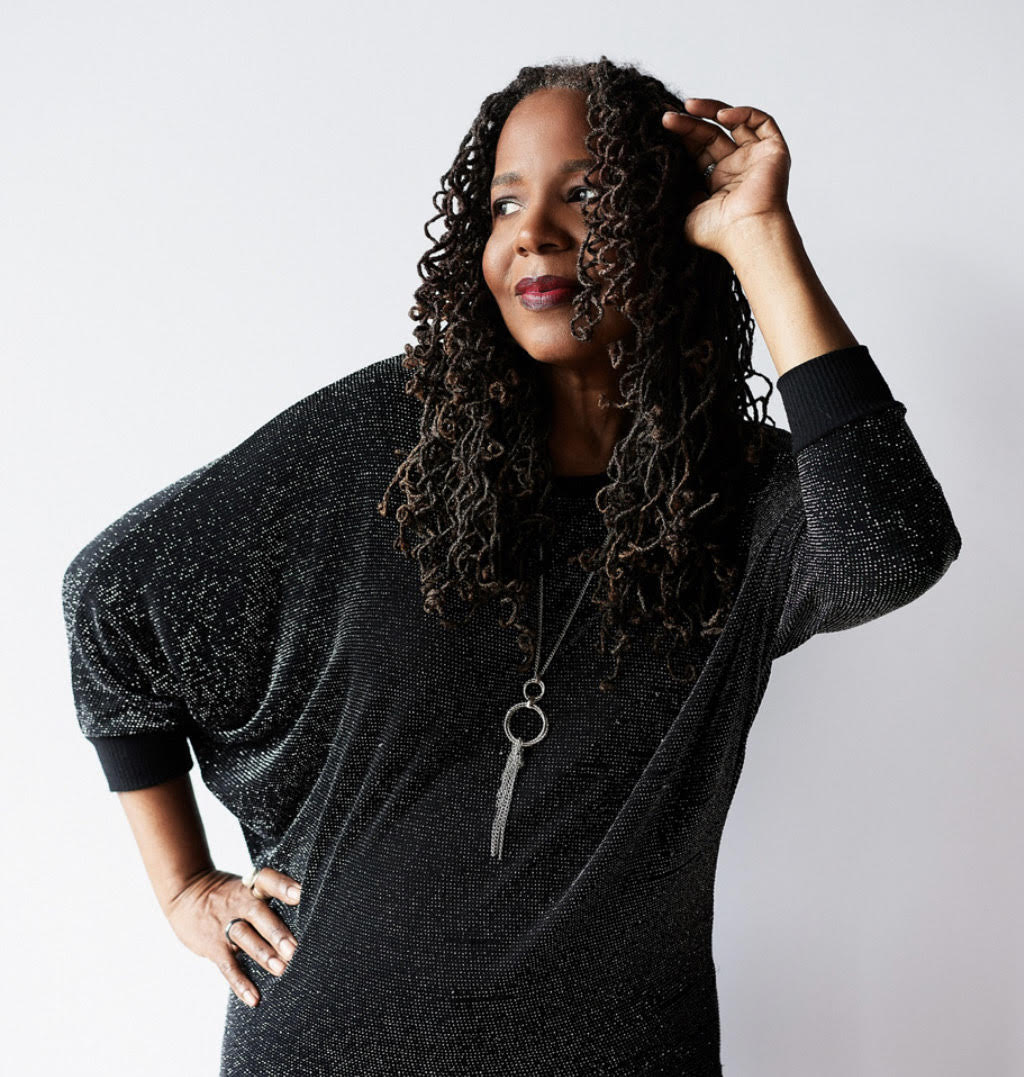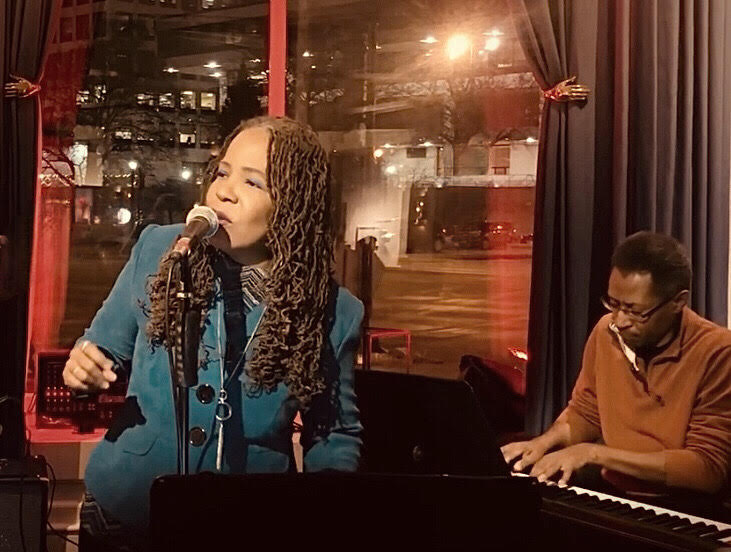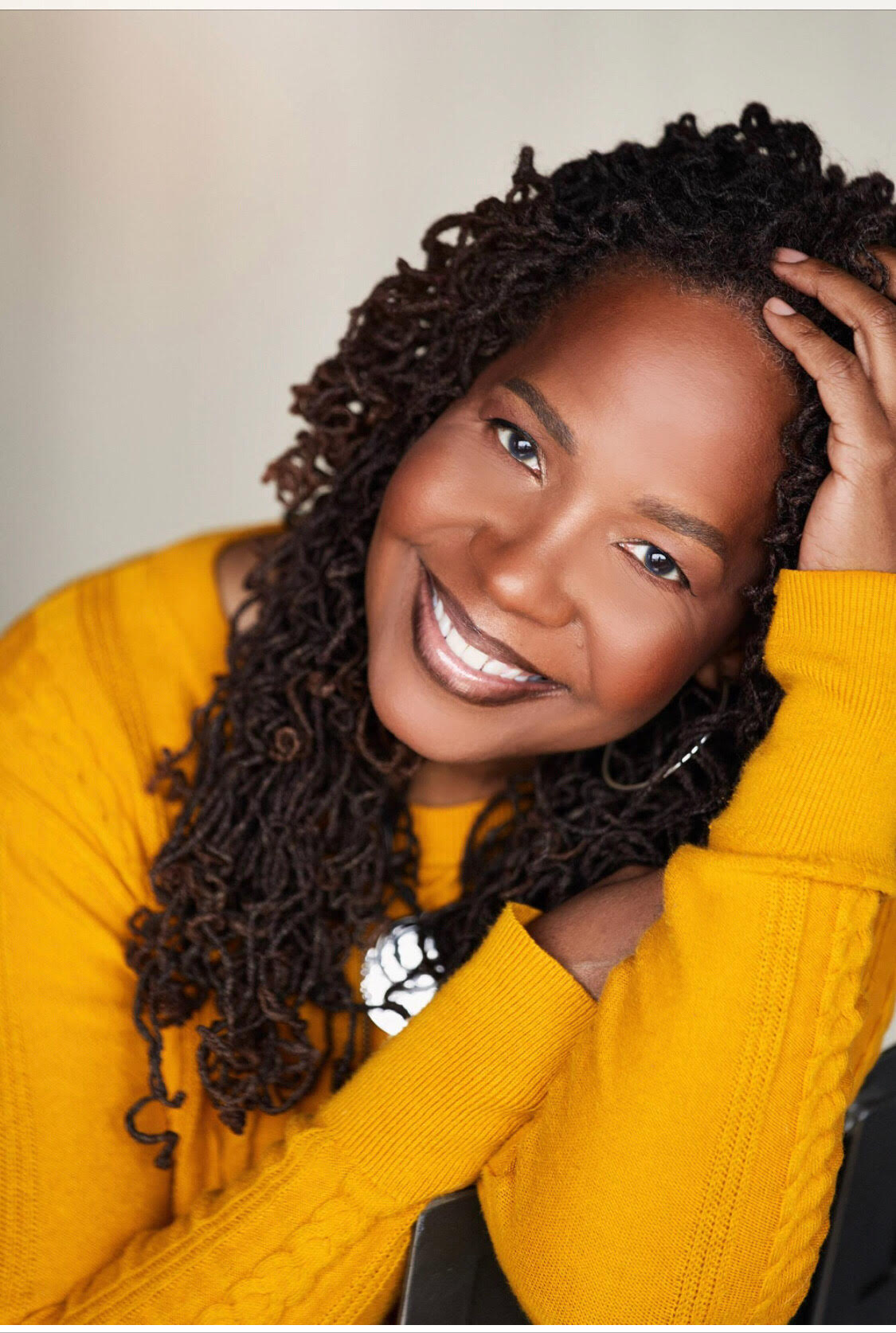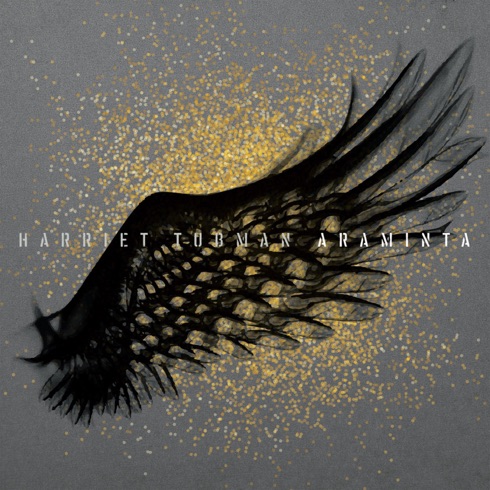
All photos courtesy Donna Woodall.
Though she was born in St. Louis, she’s lived in Milwaukee since 7th grade, so jazz singer Donna Woodall feels deep musical and cultural roots here, considers this home. She grew into a radiant, apple-cheeked purveyor of song who swings like ripe apples on a wind-blown tree. She’s since parachuted far from the tree, a full-fledged artist, perhaps the most active and accomplished female jazz singer working in Milwaukee.
She’ll be honored with a concert at the Sharon Lynne Wilson Center for the Arts on April 21: http://wilson-center.com/calendar/2023/4/21/wisconsin-artists-club-show-series-donna-woodall-group.
“I attribute my specific love of jazz music to my grandfather, who encouraged me to ‘sit and listen’ to swinging divas, and to my mother, Jeanne Woodall, who performed in Milwaukee jazz circles, leaving behind a legacy of song after her passing in 2011,” she explains. Donna diversified her performing skills, studying music, dance, and theater at UW-Milwaukee and UW-Madison. Yet, “my mother was my greatest voice teacher — she was a walking encyclopedia of jazz songs and styles.”
Her deepening knowledge, innate musicality and affable personality insinuated her into popular local jazz bands like Eddie Butts, and soon Streetlife, the dynamite jazz-fusion band led by Warren Wiegratz, which played for Milwaukee Bucks crowds for years. So, Woodall can project big, but also charm you with a tender ballad, like “Summertime.” Yet the modal vamp inserted by pianist Theo Merriweather casts a fresh shadow of tension across the languid Gershwin song. This lends strong undercurrents of meaning to a song from a “folk-opera” (Porgy and Bess) about Southern Blacks enduring the early Jim Crow era which, out of context, “Summertime” gauzes over.

Donna Woodall performs recently with keyboardist Theo Merriweather.
A measure of Woodall’s regard among the region’s jazz musicians is that Madison-based Hanah Jon Taylor, arguably the state’s premiere jazz saxophonist, has recently visited Milwaukee twice to perform alongside Woodall, at Caroline’s and St. Kate’s nightclub.
Part of that regard surely has to do with her melted-carmel voice and elastic phrasing, reflecting key influences like Sarah Vaughan, Nat King Cole and Cassandra Wilson. There’s also Woodall’s expansive repertoire, which includes personalizing atypical-to-jazz pop music songs, including Stevie Wonder’s “Don’t You Worry ‘Bout a Thing,” The Beatles’ “I Feel Fine” (in a jazzy minor-ish key), and even improbably, The Monkees’ “Last Train to Clarksville” — about a romantic relationship in its desperate last hours.
What makes a non-jazz song work for her? “The song should have some connection to my life experiences and great lyrics,” she says. “I was an English teacher for years, so the words and meaning of a song are important!” It should also be pliable enough to “be interpreted numerous ways.” It should also have “universal themes, and a sense of nostalgia to which an audience can relate.”
So, they’re usually songs with a deep history, which all the above do. She’s also had an evocative original song, “Fireworks,” accepted by NPR’s Tiny Desk contest.
For all that, she’s also enabled by a close-knit band which, at the Wilson Center, will include pianist-keyboardist Joe Kral, guitarist Bob Monagle, bassist Ethan Bender (her husband), and drummer Jeno Somali.
***
At Woodall’s recent St. Kate hotel nightclub gig, Kral consistently added drive and textural power with a Fender Rhodes keyboard setting, echoing the startling fluency of Herbie Hancock, who made the Fender Rhodes a propulsive and atmospheric alternative to acoustic piano in his Mwandishi and Headhunters funk-fusion bands.
Meanwhile, Taylor again guest-performed with Woodall, deftly blending tenor sax, flute and wind synthesizer, sometimes in the same song. The band geared up a punchy drive to “Route 66,” inspired by Nat King Cole’s version, the singer explained. It proved that Woodall, whom I first encountered performing an enchanting holiday song concert, can kick a little tail when she wants to.
She further deepened her jazz bonafides with a wrenchingly eloquent interpretation of Billie Holiday’s autobiographical “God Bless the Child.” Woodall, who taught middle school English for 30 years, enlightened the crowd by explaining that in her biography Lady Sings the Blues, Holiday said the song inspired by an argument over money between Holiday and her mother when the daughter was a young struggling performer.
Rich relations may give you a crust of bread and such/ you can help yourself, but don’t take too much/ Momma may have, and papa may have/ but God bless the child, God bless the child, whose got his own, whose got his own. 1.
The band dug deep into the song’s tough but tender emotional core. It’s how memories of a hard lifetime get etched in the soul, which bleeds out to anyone who heard Holiday sing it. That evening, we felt Holiday’s blood bleeding from Donna Woodall.

___________
This article was originally published in shorter form in The Shepherd Express: https://shepherdexpress.com/music/local-music/donna-woodalls-legacy-of-jazz/
1 “God Bless the Child” was written by Billie Holiday and Arthur Herzog Jr. in 1939. The song won a Grammy Hall of Fame Award, and was chosen as a “song of the century” by The Recording Industry Association of America and the National Endowment for the Arts.



